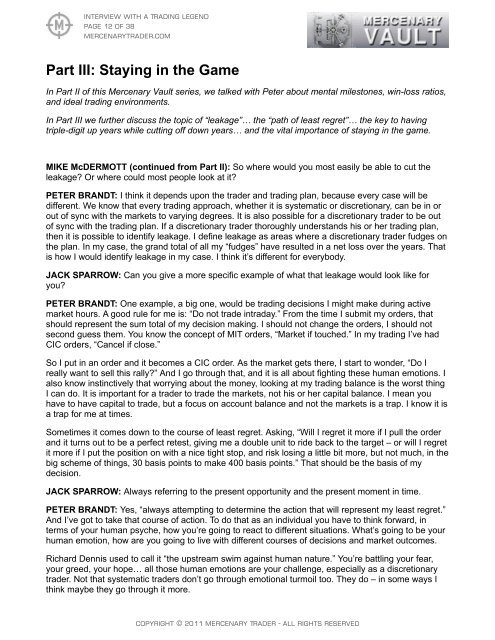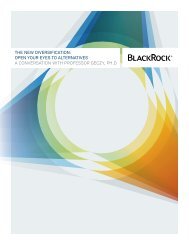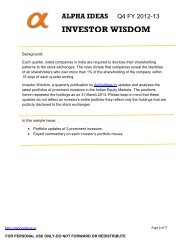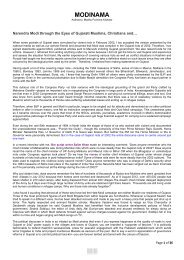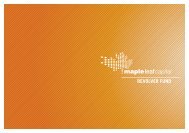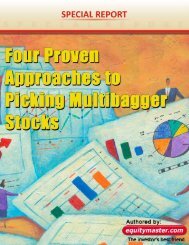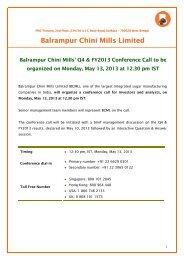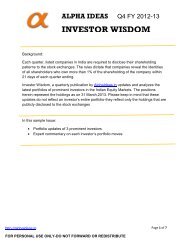Interview With a Trading Legend - Mercenary Trader
Interview With a Trading Legend - Mercenary Trader
Interview With a Trading Legend - Mercenary Trader
Create successful ePaper yourself
Turn your PDF publications into a flip-book with our unique Google optimized e-Paper software.
<strong>Interview</strong> <strong>With</strong> a <strong>Trading</strong> <strong>Legend</strong><br />
Page 12 of 38<br />
mercenarytrader.com<br />
Part III: Staying in the Game<br />
In Part II of this <strong>Mercenary</strong> Vault series, we talked with Peter about mental milestones, win-loss ratios,<br />
and ideal trading environments.<br />
In Part III we further discuss the topic of “leakage”… the “path of least regret”… the key to having<br />
triple-digit up years while cutting off down years… and the vital importance of staying in the game.<br />
MIKE McDERMOTT (continued from Part II): So where would you most easily be able to cut the<br />
leakage? Or where could most people look at it?<br />
PETER BRANDT: I think it depends upon the trader and trading plan, because every case will be<br />
different. We know that every trading approach, whether it is systematic or discretionary, can be in or<br />
out of sync with the markets to varying degrees. It is also possible for a discretionary trader to be out<br />
of sync with the trading plan. If a discretionary trader thoroughly understands his or her trading plan,<br />
then it is possible to identify leakage. I define leakage as areas where a discretionary trader fudges on<br />
the plan. In my case, the grand total of all my “fudges” have resulted in a net loss over the years. That<br />
is how I would identify leakage in my case. I think it’s different for everybody.<br />
JACK SPARROW: Can you give a more specific example of what that leakage would look like for<br />
you?<br />
PETER BRANDT: One example, a big one, would be trading decisions I might make during active<br />
market hours. A good rule for me is: “Do not trade intraday.” From the time I submit my orders, that<br />
should represent the sum total of my decision making. I should not change the orders, I should not<br />
second guess them. You know the concept of MIT orders, “Market if touched.” In my trading I’ve had<br />
CIC orders, “Cancel if close.”<br />
So I put in an order and it becomes a CIC order. As the market gets there, I start to wonder, “Do I<br />
really want to sell this rally?” And I go through that, and it is all about fighting these human emotions. I<br />
also know instinctively that worrying about the money, looking at my trading balance is the worst thing<br />
I can do. It is important for a trader to trade the markets, not his or her capital balance. I mean you<br />
have to have capital to trade, but a focus on account balance and not the markets is a trap. I know it is<br />
a trap for me at times.<br />
Sometimes it comes down to the course of least regret. Asking, “Will I regret it more if I pull the order<br />
and it turns out to be a perfect retest, giving me a double unit to ride back to the target – or will I regret<br />
it more if I put the position on with a nice tight stop, and risk losing a little bit more, but not much, in the<br />
big scheme of things, 30 basis points to make 400 basis points.” That should be the basis of my<br />
decision.<br />
JACK SPARROW: Always referring to the present opportunity and the present moment in time.<br />
PETER BRANDT: Yes, “always attempting to determine the action that will represent my least regret.”<br />
And I’ve got to take that course of action. To do that as an individual you have to think forward, in<br />
terms of your human psyche, how you’re going to react to different situations. What’s going to be your<br />
human emotion, how are you going to live with different courses of decisions and market outcomes.<br />
Richard Dennis used to call it “the upstream swim against human nature.” You’re battling your fear,<br />
your greed, your hope… all those human emotions are your challenge, especially as a discretionary<br />
trader. Not that systematic traders don’t go through emotional turmoil too. They do – in some ways I<br />
think maybe they go through it more.<br />
Copyright © 2011 <strong>Mercenary</strong> <strong>Trader</strong> - All Rights Reserved


